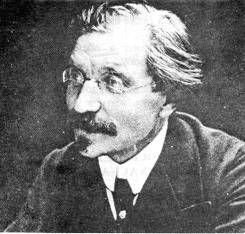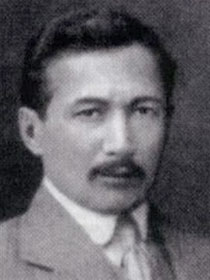
Sholem Aleichem
There’s an old Yiddish proverb that says, “If all men pulled in the same direction, the world would topple over.” Jews have long loved a good argument over politics or religion. And it turns out that the same holds true for Jewish folk songs. As Pro Musica Hebraica gears up for our spring concert, it’s worth recalling one of the stranger disputes in modern Jewish history. The episode in question took place in early twentieth-century Russia, when the founding father of modern Jewish music, composer and critic Joel Engel and the great Yiddish writer Sholem Aleichem squared off in a nasty exchange about Yiddish folk songs. Their argument centered on one question: What is a Jewish folk song?
In the late 1890s, a Kiev lawyer turned composer named Mark Warshavsky began penning new Yiddish-language songs about traditional Jewish life in the shtetl. So popular were these sentimental hits, such as “Oyfn pripetshik” (On the Hearth) and “Di mezinke oysgegeben” (The Youngest Daughter Married Off), and so accurate in their depiction of Jewish folklore, that many Jews assumed them to be anonymous folk songs. A great fan of Jewish music, Sholem Aleichem took it upon himself to become Warshavsky’s mentor and impresario. For a few years the two men actually toured from town to town in the Pale of Settlement performing as a musical-literary act. Then in 1900 Sholem Aleichem helped publish Warshavsky’s first song collection, titled “Jewish Folksongs.” In the book’s preface, he lavished praise on these Yiddish songs as “a new kind of song,” beautifully “simple and genuinely Jewish, not artificial.”When word of Warshavsky’s new book reached Joel Engel in Moscow a few months later, he became incensed. A sophisticated, conservatory-trained music scholar, Engel had just recently launched the modern study of Ashkenazi Jewish music. Even at that point in time, the lines between Jewish “folk” songs, products of anonymous oral tradition and newer sorts of commercial popular music were rapidly disappearing in Eastern Europe. Yet Engel and his fellow folklorists insisted on finding genuine, authentic folk songs of the shtetl untainted by modernity, let alone fake folk songs composed by big-city Jewish lawyers. In a prominent review of the book, Engel thus denounced Warshavsky’s songs as inauthentic imitations and grievous offenses against the real tradition of Jewish folk music. With the passage of time, he argued, the Jewish people would determine “what is folk and what is not.” Simply to slap the label on publications in advance, however, amounted to “a deliberate forgery.”The critique prompted responses from both Warshavsky and Sholem Aleichem. Back and forth the argument went in the pages of the Jewish press. Warshavsky pleaded ignorance to Engel’s theoretical concerns, and said he was no musical expert, just an amateur artist. Engel mocked Warshavsky’s ignorance and compared his pseudo-folk treatments of Jewish melodies to “forcing an old, distinguished Hasid in white stockings to dance a Viennese waltz.” Sholem Aleichem returned the favor by blasting Engel’s academic pretensions and his Russified background. After all, he noted, Engel did not even know Yiddish. Sholem Aleichem dismissed musicology as an unnecessary, even dangerous Gentile threat to Jewish culture. Why bother with all that fancy-shmancy analysis of what makes a folk song, he argued?

Joel Engel
“Which Jew doesn’t understand how to sing? It’s one of the three things at which we, Jews, are the greatest experts in the world: wine, song, and diamonds!”
In the end, the founding fathers of Yiddish music and Yiddish literature agreed to disagree. Engel went on to become the leader of a Jewish national musical movement among composers in Russia. Sholem Aleichem went on to create his own imaginary shtetl in his stories that turned Yiddish folklore into myth (and was ultimately transmuted by Broadway into “Fiddler on the Roof”). And Warshavsky’s songs themselves spread across the Jewish globe, continuing in popularity in Europe, America, and Israel today. Fittingly, the upcoming Pro Musica Hebraica concert devoted to Yiddish songs includes Warshavsky’s “Oyfn Pripetshik,” a tribute to both the vanished world of the shtetl and the grand tradition of Jewish argument that lives on today.
James Loeffler will speak about Yiddish songs in a preconcert lecture at the forthcoming Pro Musica Hebraica concert on February 10. This historical episode and further discussion of Yiddish folk songs can be found in his new book, The Most Musical Nation: Jews and Culture in the Late Russian Empire.